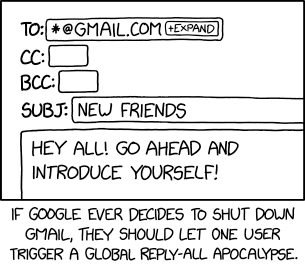*@gmail.com

Hi all, just replying to loop in *@outlook.com and *@yahoo.com.

Hi all, just replying to loop in *@outlook.com and *@yahoo.com.
When performing operations on computer files using a command prompt, the asterisk (*) may be used to represent a collection of items whose names match a particular format. For example, "*.txt" denotes all files whose names end in ".txt". This is called a wildcard character. Similarly, the e-mail address *@gmail.com, as illustrated in the comic, is a proposed feature from Randall that would send an email to every Gmail user, without having each and every valid Gmail address at hand (of which there are about 1.8 billion). For obvious reasons, this is not actually a feature, but Randall suggests that if Google ever wanted to shut Gmail down, they could either do it this way (possibly causing a service-ending overload of resources) or allow someone this one last boon (as a farewell gift, knowing that there would be relatively few additional repercussions to deal with). Google does not seem particularly likely to shut down Gmail, as it is a source of information for their advertising and other businesses, but they are known for abandoning programs and projects even after they have been found useful (by at least some people) for years.
Reply-all is a sometimes useful feature of email that nonetheless commonly causes headaches and annoyances for both users and administrators. By allowing users to simply reply to everyone copied on the email, it encourages users to do this rather than think carefully about which people their response should be addressed to. This causes lots of users to receive irrelevant emails, and email servers to have to process and store a lot of unnecessary data. Randall's email is essentially designed to induce every Gmail user to email every other Gmail user, generating an excessively large number of emails.
A recurring phenomenon for email users, especially in the early Internet days of the 1990s and 2000s, was a reply all storm – someone would start a message to a very large group, perhaps hundreds, and even if only 5% of recipients replied to say something like “take me off this list“, a storm of dozens of replies would soon follow. Inevitably, new replies to everyone would start saying things like, “stop Replying All!” If this were done with millions of Gmail users instead of just dozens or hundreds, their result would be apocalyptic. A similar real-life example was a 2016 incident involving 1.2 million staff at the UK National Health Service.
In reality, the asterisk wildcard is not generally usable via email servers, although email clients may sometimes implement such a function, internally, perhaps to support mailing-list functions (though more commonly this is done via named address-book 'groups'). That said, the asterisk character is a valid one that may form part of the name of a mailbox, including group-boxes that might facilitate server-side distribution.
Now, organizations operating their own e-mail domains frequently implement mailing lists such as all@example.com or staff@example.com, and these lists occasionally cause reply-all storms, which usually results in the organization restricting access to the list to trusted administrators. Here, Randall proposes doing the opposite and opening the list of all Gmail users to everybody.
The title text suggests a reply where someone decides that all users of Outlook.com (formerly Hotmail) and Yahoo! Mail, two further well-known mail services with similarly large user bases, should also be included - "loop in" is common business jargon for meaning "include in communication about something", related to "being in the loop" meaning "being informed and up to date". Accepting this would trigger an even bigger reply-all "apocalypse", as the chain will get even bigger and will include accounts for services not presumably about to be shut down like Gmail is in the comic, thus bringing down all significant platforms for e-mail services. This also alludes to an occurrence in email chains where a user replies to simply add another user into the chain, which doesn't add much information to the group.